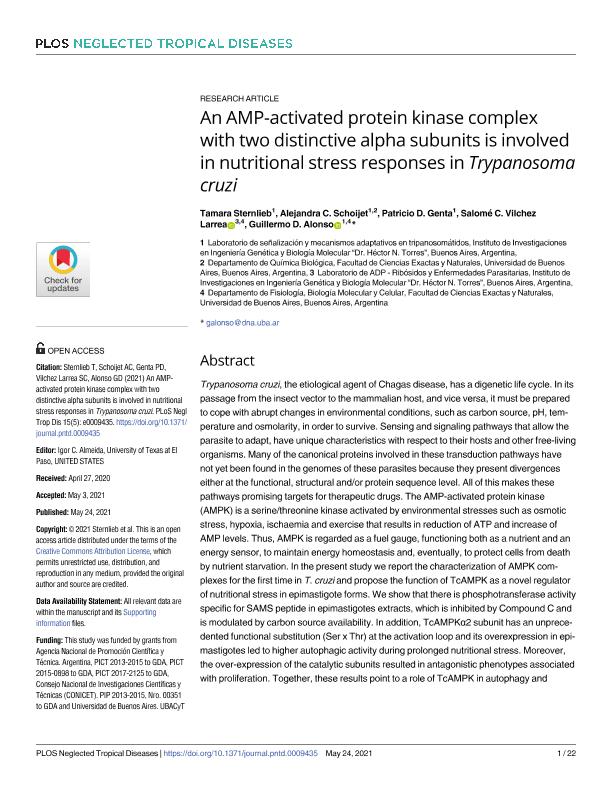Mostrar el registro sencillo del ítem
dc.contributor.author
Sternlieb, Tamara

dc.contributor.author
Schoijet, Alejandra Cecilia

dc.contributor.author
Genta, Patricio D.
dc.contributor.author
Vilchez Larrea, Salomé Catalina

dc.contributor.author
Alonso, Guillermo Daniel

dc.date.available
2021-08-10T12:13:52Z
dc.date.issued
2021-05-24
dc.identifier.citation
Sternlieb, Tamara; Schoijet, Alejandra Cecilia; Genta, Patricio D.; Vilchez Larrea, Salomé Catalina; Alonso, Guillermo Daniel; An AMP-activated protein kinase complex with two distinctive alpha subunits is involved in nutritional stress responses in Trypanosoma cruzi; Public Library of Science; Plos Neglected Tropical Diseases; 15; 5; 24-5-2021; 1-22
dc.identifier.issn
1935-2735
dc.identifier.uri
http://hdl.handle.net/11336/138059
dc.description.abstract
Trypanosoma cruzi, the etiological agent of Chagas disease, has a digenetic life cycle. In itspassage from the insect vector to the mammalian host, and vice versa, it must be preparedto cope with abrupt changes in environmental conditions, such as carbon source, pH, temperatureand osmolarity, in order to survive. Sensing and signaling pathways that allow theparasite to adapt, have unique characteristics with respect to their hosts and other free-livingorganisms. Many of the canonical proteins involved in these transduction pathways havenot yet been found in the genomes of these parasites because they present divergenceseither at the functional, structural and/or protein sequence level. All of this makes thesepathways promising targets for therapeutic drugs. The AMP-activated protein kinase(AMPK) is a serine/threonine kinase activated by environmental stresses such as osmoticstress, hypoxia, ischaemia and exercise that results in reduction of ATP and increase ofAMP levels. Thus, AMPK is regarded as a fuel gauge, functioning both as a nutrient and anenergy sensor, to maintain energy homeostasis and, eventually, to protect cells from deathby nutrient starvation. In the present study we report the characterization of AMPK complexesfor the first time in T. cruzi and propose the function of TcAMPK as a novel regulatorof nutritional stress in epimastigote forms. We show that there is phosphotransferase activityspecific for SAMS peptide in epimastigotes extracts, which is inhibited by Compound C andis modulated by carbon source availability. In addition, TcAMPKα2 subunit has an unprecedentedfunctional substitution (Ser x Thr) at the activation loop and its overexpression in epimastigotesled to higher autophagic activity during prolonged nutritional stress. Moreover,the over-expression of the catalytic subunits resulted in antagonistic phenotypes associatedwith proliferation. Together, these results point to a role of TcAMPK in autophagy and nutrient sensing, key processes for the survival of trypanosomatids and for its life cycleprogression.
dc.format
application/pdf
dc.language.iso
eng
dc.publisher
Public Library of Science

dc.rights
info:eu-repo/semantics/openAccess
dc.rights.uri
https://creativecommons.org/licenses/by-nc-sa/2.5/ar/
dc.subject
Trypanosoma cruzi
dc.subject
AMPK
dc.subject
Phosphorylation
dc.subject
Autophagy
dc.subject.classification
Biología Celular, Microbiología

dc.subject.classification
Ciencias Biológicas

dc.subject.classification
CIENCIAS NATURALES Y EXACTAS

dc.title
An AMP-activated protein kinase complex with two distinctive alpha subunits is involved in nutritional stress responses in Trypanosoma cruzi
dc.type
info:eu-repo/semantics/article
dc.type
info:ar-repo/semantics/artículo
dc.type
info:eu-repo/semantics/publishedVersion
dc.date.updated
2021-07-30T19:19:38Z
dc.journal.volume
15
dc.journal.number
5
dc.journal.pagination
1-22
dc.journal.pais
Estados Unidos

dc.journal.ciudad
San Francisco
dc.description.fil
Fil: Sternlieb, Tamara. Consejo Nacional de Investigaciones Científicas y Técnicas. Instituto de Investigaciones en Ingeniería Genética y Biología Molecular "Dr. Héctor N. Torres"; Argentina
dc.description.fil
Fil: Schoijet, Alejandra Cecilia. Consejo Nacional de Investigaciones Científicas y Técnicas. Instituto de Investigaciones en Ingeniería Genética y Biología Molecular "Dr. Héctor N. Torres"; Argentina
dc.description.fil
Fil: Genta, Patricio D.. Consejo Nacional de Investigaciones Científicas y Técnicas. Instituto de Investigaciones en Ingeniería Genética y Biología Molecular "Dr. Héctor N. Torres"; Argentina
dc.description.fil
Fil: Vilchez Larrea, Salomé Catalina. Consejo Nacional de Investigaciones Científicas y Técnicas. Instituto de Investigaciones en Ingeniería Genética y Biología Molecular "Dr. Héctor N. Torres"; Argentina
dc.description.fil
Fil: Alonso, Guillermo Daniel. Consejo Nacional de Investigaciones Científicas y Técnicas. Instituto de Investigaciones en Ingeniería Genética y Biología Molecular "Dr. Héctor N. Torres"; Argentina
dc.journal.title
Plos Neglected Tropical Diseases
dc.relation.alternativeid
info:eu-repo/semantics/altIdentifier/url/https://dx.plos.org/10.1371/journal.pntd.0009435
dc.relation.alternativeid
info:eu-repo/semantics/altIdentifier/doi/http://dx.doi.org/10.1371/journal.pntd.0009435
Archivos asociados
